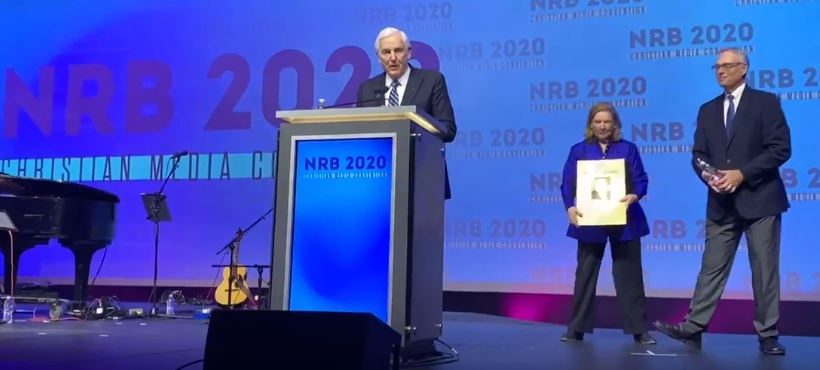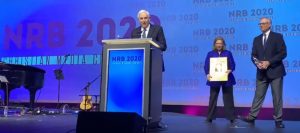When A Preacher’s Content Is “Re-Purposed” To A Different Medium, What Qualifies As Proper Attribution?

On Sundays, David Jeremiah delivers sermons to the crowd at Shadow Mountain Community Church, his San Diego megachurch. Throughout the week, his messages are broadcast on radio and TV by his Turning Point Ministries.

Jeremiah is one of the nation’s best known evangelical preachers. His bio cites his “passion for preaching and teaching the Word of God,” and he’s also a bestselling author of books, Bible studies, and devotionals. But in some sermons, the 81-year-old Jeremiah sometimes incorporates long passages from other authors’ writing without giving credit.
An examination of half a dozen of Jeremiah’s archived sermons shows that:
- Jeremiah uses others’ material without saying where it came from;
- His church and radio audiences are sometimes not informed that he is using others’ work;
- His sermon outlines in the archives do not cite the borrowed material;
- Only the televised sermons indicate the sources of some of his borrowing.
One example: a May 13 sermon, “The Power of a Godly Life,” which has been viewed more than 1.6 million times on YouTube. At 16:20 minutes into the sermon, Jeremiah quotes a lengthy passage from Juanita Ryan’s book, An Enduring Embrace, without crediting her. TV viewers see a brief on-screen notice, “Excerpt from Juanita Ryan, An Enduring Embrace.” But radio listeners have no way of knowing that Jeremiah is quoting Ryan. It is not clear if the live audience can see the attributions on the screens in the church.
In another case, Jeremiah seems to claim authorship of a lengthy passage taken from Lloyd John Ogilvie’s book, You Are Loved and Forgiven. At the 9:30 mark, Jeremiah says, “I wrote down some of the things people are pushing on us now in the name of religion.” He then reads the Ogilvie passage without attribution. TV viewers see a brief on-screen citation, but others don’t know that the material Jeremiah said he “wrote down” came directly from Ogilvie’s book.
Access to MinistryWatch content is free. However, we hope you will support our work with your prayers and financial gifts. To make a donation, click here.
One aired sermon includes portions of a BBC News report, again credited only on Jeremiah’s television broadcast.
One of Jeremiah’s favorite sources of Warren Wiersbe. In the sermon, “The Aftermath of Elijah’s Mountaintop Victory,” Jeremiah quickly segues from his own observations to comments of Wiersbe at the 23:30 mark.
“I think I’ve found Elijah’s life verse,” Jeremiah says, reading Isiah 40:31 before moving to a lengthy quote from Wiersbe’s Be Responsible.
In another sermon entitled, “What It Means to Be ‘In Christ,’” Jeremiah quotes Wiersbe at the 15:30 mark.
Wiersbe is also quoted in the sermon “How Does Faith Work? A Lesson from Elijah in the Bible” at the 20:29 mark. As usual, TV viewers are told Wiersbe is the source, but not radio listeners.
Jeremiah’s practice was brought to MinistryWatch’s attention by a regular reader who has been watching Jeremiah faithfully for years and has a deep appreciation for his teaching ministry but is frustrated by this practice of using material from others without proper attribution.
“It irks me that he’s passing this material off as it’s his,” said the viewer, who wonders why Jeremiah leaves “the audience with no clue.”
MinistryWatch reached out to Jeremiah’s ministry to find out about their policy on attribution. We received this statement from Turning Point’s Myrna Davis:
Thank you for reaching out to Turning Point in response to the inquiry from one our constituents regarding a missing citation in Dr. Jeremiah’s May 13 message and the excerpt from Juanita Ryan in An Enduring Embrace. Please let me assure you that failing to mention her name was an oversight, which we quickly addressed in the television program the viewer watched.
Turning Point is dedicated to ensuring that citations are appropriately quoted at every opportunity. Every study guide, book, and magazine goes through extensive editing and proofing to provide the appropriate credit to authors or speakers who may be quoted. That is our goal in every radio program, message, or other content as well. If an unforeseen omission occurs, we insert the attribution as a lower-third on television, as the inquiry mentioned. We then remove the quote from our radio program before it is aired if possible.
Please assure our viewer that if an omission occurs, we address it with the greatest urgency. As an author who is quoted widely, Dr. Jeremiah understands the importance and value of an author’s work and would not represent another author’s work as his own.
David Jeremiah’s ministry is a member of the National Religious Broadcasters. The brief seven-point code of ethics of the National Religious Broadcasters doesn’t mention plagiarism, and it’s third point offers no guidance on citations: “I will recognize and respect what the Lord is doing through other individuals and organizations while refraining from unnecessary criticism of them (I Peter 3:8-9).”
In the digital age, when content is often “re-purposed” across platforms, attribution standards are sometimes difficult to follow. What might qualify as proper attribution in the original medium might not work in another medium, or that attribution – such as a graphic on a screen – might be lost entirely in a podcast, radio program, or other medium.
Southern Baptist leader J.D. Greear’s 2012 article, “What Counts as Plagiarism in a Sermon?” wrestled with the issue and concluded: “When I take a direct point or a line or the creative wording of a truth from someone, I feel like I should cite.” Greear also wrote: “When I give a list that someone else has come up with or offer some piece of cultural analysis, I feel like I should cite.”
Warren Throckmorton is a professor at Grove City College who has written about pastors who plagiarize, gave MinistryWatch his opinion. He told MinistryWatch, “In reviewing these sermons, the brief caption on the television screen is an inadequate citation. The church and radio audience cannot see this. The TV citation is inadequate for a quote since the audience doesn’t know when the material Rev. Jeremiah quotes starts and stops. Definitions of plagiarism, including this one used where I teach at Grove City College, say that plagiarism is ‘direct quotation of another’s words…without using quotation marks or properly citing the source of those words.’ Rev. Jeremiah did not properly cite the sources he used.”



